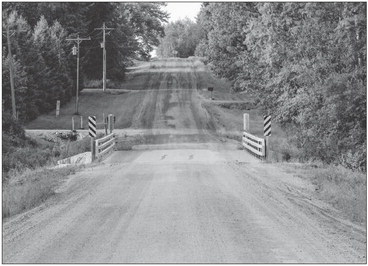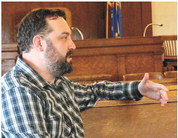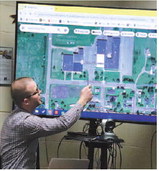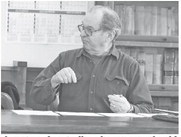Town of Colby wins lawsuit vs. Green Grove


On Aug. 13, a Clark County judge ruled in favor of the Town of Colby in a lawsuit that dates back to June of 2021.
Judge Lindsey Boon Brunette’s decision on a motion by Green Grove for summary judgement said that Colby would not be charged over $25,000 for the reconstruction of a bridge that borders the two townships.
The bridge in question is located on Meridian Ave., about two miles south of Curtiss and was replaced in 2020. According to a notice sent by Green Grove to Colby, the bridge project cost $52,776.85.
Under normal circumstances, the townships would split the cost of the bridge project based on each town’s equalized valuations. In 2020, Green Grove had $45,788,400 in equalized valuation and Colby had $45,719,100 meaning Colby would be on the hook for 48 percent of the bridge construction project which came out to $25,332.89.
Wisconsin state statute 82.23 states: “Unless otherwise provided by statute or agreement, every highway bridge on a city, village or town boundary shall be repaired and maintained by any adjoining municipality in which the bridge is located. The cost of repairs and maintenance shall be paid by the adjoining municipalities in proportion to the last equalized valuation of the property in the adjoining municipalities.”
The statute was cited by Green Grove attorney Lee D. Turonie of Dempsey Law when the town sent a notice to Colby officials that they would need to be paid for Colby’s half of the bridge.
On Dec. 10, 2020, Colby sent Green Grove a letter notifying the town that their “claim” against Colby had been disallowed. By state statute, this meant no legal action could be brought on the claim after six months. Town of Colby Chairman Larry Oehmichen said this was to ensure the process of a lawsuit wouldn’t be dragged out over a lengthy period of time. Turonie said the opportunity to settle the matter was made more difficult because of the time constraint that was levied against Green Grove and said Colby’s unwillingness to settle caused the lawsuit.
“Colby resorted to attorneys because they simply did not want to pay half,” Turonie said. “Green Grove’s claim is for over $27,000 yet they made a final offer to settle for $20,000 after negotiations back and forth. Colby responded by not making that offer. Again, this was Colby’s decision, not Green Grove.”
Oehmichen said Colby sent Green Grove a check for $17,500 but Green Grove’s final offer of $20,000 would not be met. However, in a June 2021 meeting, the Town of Colby board was told they had offered to meet the $20,000 request but were turned down, according to the meeting minutes.
Oehmichen said by the time they had decided to give the full $20,000, the town of Green Grove had already decided to sue.
He said the whole negotiation was made to avoid going to court.
“I said to my town board, ‘If they sue us, which I think they’re going to, we’re going to run up a bigger bill than [$17,500].’”
According to Brunette’s decision, the two townships reached an agreement in 1929. That 1929 agreement was under dispute during the court proceedings but ultimately didn’t factor into the decision because Brunette said a 2010 agreement that was reached superseded any previous agreements.
Oehmichen said the 2010 agreement was put in place because after applying for a road improvement grant, he was notified by the state that the section of road Colby had been working on since the 1929 agreement was still registered as Green Grove’s section of road at the state level.
Oehmichen said he went to Green Grove Chairman Mark Klein and told him what the state had said. According to Oehmichen, the two agreed to write up an agreement and switch the road assignment to match what the state had in its records.
The 2010 agreement struck by Oehmichen and Klein was approved by their respective boards, and said Green Grove assumed responsibility of the section of road that contains the bridge. Colby then took responsibility of a section of road that was located south of the bridge. In the document, Brunette states that the agreement did not mention the bridge or provide for its joint maintenance.
The two towns agreed that the agreement was not a highway order and would not have been registered with the Wisconsin Department of Transportation.
After entering into the agreement, Green Grove paid for yearly bridge inspections including all labor and equipment costs and did not seek reimbursement from Colby for those expenditures. According to the decision, Green Grove began saving money for the eventual replacement of the bridge.
In a deposition of Klein, it was found that the Green Grove Town Clerk sent an email to the Clark County Highway Department on Oct. 22, 2010 admitting that Green Grove had sole responsibility for repairing and replacing the bridge.
In May of 2013, Green Grove’s Chairman requested that the county highway commissioner place “the bridge on Meridian Ave., Town of Green Grove” on the list for replacement in the program for federal bridge aid funds.
According to the decision, Green Grove did not establish that it ever informed Colby about its decision to replace the bridge and seek federal funding. There were numerous other instances that pointed towards Green Grove’s ownership of the bridge and their lack of intent to make Colby pay for a portion of the cost of replacing it.
The decision states, “Only after the bridge construction had been completed did Green Grove demand that Colby reimburse Green Grove $27,048.73 as Colby’s alleged ‘share’ of the bridge repair and/or replacement costs.”
Green Grove argued that they did not notify Colby of the requested funds until after the project was completed because they were waiting for procession and approvals of the applications and work by other agencies before billing or seeking reimbursement. Brunette states, “But this makes no sense given the above.”
Turonie said Green Grove acted as the project sponsor which only requires one municipality of a bordering roadway to file for state funds.
“Both towns receive an equal amount of state general transportation aid money for this stretch of road because the state just splits money for boundary roads,” Turonie said. “The Wisconsin Department of Transportation requires only one ‘project sponsor’ apply for an assistance project like the one used here. Green Grove just did the paperwork, which is normal and done all over the state.”
Brunette focused on the first sentence of Wis. Stat. 82.23 which says “...unless otherwise provided by statute or agreement.” She said this clause in the state statute means the only thing in question is whether an agreement exists that causes the statute not to provide for the joint repair of the bridge.
Brunette referenced a decision made in the early 1900s which noted the Town of Pella and Town of Larabee, both located in Waupaca County, had a similar dispute concerning a bridge that was to be replaced. In that case, the two towns did not mention a bridge nor imply that it should be jointly maintained. The Wisconsin Supreme Court concluded that the town responsible for maintaining the portion of road where the bridge was located was also solely responsible for maintaining and replacing the bridge.
That ruling set the precedent for the fact that even though neither side mentioned the bridge in their 2010 agreement, it should not be assumed that the two entities had to split the cost of maintenance and replacing the bridge on Meridian Ave., according to Brunette’s decision.
Brunette said, “Green Grove has not established that the 2010 agreement is invalid or unenforceable and therefore, the parties are bound by their contract.”
She went on to explain that Green Grove’s motion for summary judgement was denied and that based on the court’s review of the material facts and the conclusions of law, summary judgment is appropriate in favor of Colby.
Oehmichen said he is happy for the outcome but wishes the matter wouldn’t have had to go to court in the first place.
“I wish it wouldn’t have come to this because I hate spending taxpayers’ money but it did,” Oehmichen said. “Thank goodness it’s over.”
Oehmichen revealed that even though Colby won the case, they still spent $21,000 in legal fees as of Aug. 16.
When asked if the next course of action might involve an appeal, Turonie said that all options are still on the table.
“Green Grove will certainly evaluate all options,” Turonie said. “Colby is a neighbor who is not going anywhere. Meridian Avenue contains multiple water crossings. Therefore, there have been both short term and long term considerations the whole time.”

WATER UNDER THE BRIDGE? -The Meridian Avenue bridge that has caused controversy over the past couple of years between the Town of Colby and Town of Green Grove was recently renovated to fix glaring issues to the bridge.STAFF PHOTO/NEAL HOGDEN





